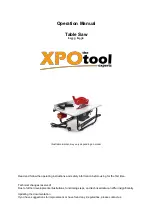
24
www.evolutionpowertools.com
REPETITIVE CROSS CUTTING
Repetitive Cross Cutting is the process of cutting a number of
pieces to the same length without having to mark out each
piece separately.
Note:
We recommend that repetitive cross-cutting is carried
out with the Mitre Gauge positioned on the LH side of the
machine, with the Rip Fence on the RH side of the machine
(Fig. 42)
.
WARNING:
The Rip Fence can be used as a length stop only as
long as it is properly set and adjusted.
To set the Rip Fence for Repetitive Cross Cutting:
• Set the Rip Fence at the required distance from the
saw blade.
• We recommend you adjust and align the back of the Rip
Fence faceplate level with the front of the saw blade
(Fig. 43)
.
This setting will afford clearance for the material as it passes
through the saw blade. It will allow the cut material to move
sideways away from the saw blade, with little risk of any
binding or kickback occurring.
Index and hold the material to be cut against the Mitre Gauge
faceplate and the also index the material gently against the
Rip Fence. Hold the material and Mitre Gauge securely with
your left hand. Gently push the workpiece through the saw.
Use a push stick, if necessary, in your right hand to guide the
workpiece on the RH side of the blade.
RIP CUTTING
Rip cutting is cutting along the length of a piece of material
rather than across it.
Rip cutting should always be done with the Rip Fence Face set
to the desired width and on the RH side of the machines table.
The Mitre Gauge is not required for this operation, and should
be stored safely off the machine for future use.
Note:
Check that the Rip Fence is locked in position and is
parallel to the saw blade.
Check that the Riving Knife is properly aligned with the saw blade.
When ripping small section material a push stick should be
used to feed/guide the final 300mm of the material past the blade.
a push stick should always be used when making cuts of less
than 300mm.
Fig. 42
Fig. 43





































